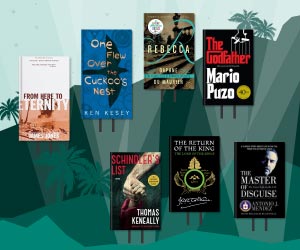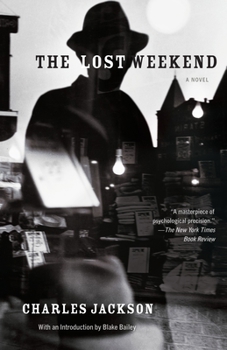The Lost Weekend
Select Format
Select Condition 
Book Overview
The classic tale of one man's struggle with alcoholism, this revolutionary novel remains Charles Jackson's best-known book--a daring autobiographical work that paved the way for contemporary addiction literature. It is 1936, and on the East Side of Manhattan, a would-be writer named Don Birnam decides to have a drink. And then another, and then another, until he's in the midst of what becomes a five-day binge. The Lost Weekend moves with unstoppable...
Format:Paperback
Language:English
ISBN:0307948714
ISBN13:9780307948717
Release Date:February 2013
Publisher:Knopf Doubleday Publishing Group
Length:272 Pages
Weight:0.65 lbs.
Dimensions:0.8" x 5.3" x 8.2"
Customer Reviews
5 ratings
The inside of the bottle
Published by Thriftbooks.com User , 17 years ago
Having seen the film I decided to read the book. The Hollywood ending of the film spured me on to find out how the book really ended. I found the book had much more depth than the film. Jackson's way of writing is so intimate that you can feel, hear and perhaps even smell Mr. Don Birman, who is the central character in the book. Jackon takes you inside his main character and slowly brings you down, down, down into the murcky depths of a troubled human being. It is obvious that the drinking is 'only' the manifestation of much deeper problems which Don Birman has. However the mental constructions which Don generates to explain, know (absolutely!), manipulate, justify, etc. his state of being, shows how an alcoholic survives as he swims in his sea of alcohol. It is a harrowing tale. This is a story about alcoholism written from the inside out. Read the book and learn how many alcoholism stories really end up. A true masterpiece.
"The barometer of his emotional nature was set for a spell of riot"
Published by Thriftbooks.com User , 18 years ago
This book is definitely an instance of the book being better than the film, mainly because there is a wealth of inner dwelling in the book that cannot be captured on a screen. Jackson's prose starts out seeming a bit overblown, but quickly develops into a selfish, self-absorbed, and often offhandedly comical muse of the befuddled brain. Charming gallantry, lies and fictions, excursions seeking pawn money, reminiscing of days past, each one poetically narrated by Jackson. His protagonist, Don Birnam, never once denies who or what he is. He's an alcoholic, and he serves only himself. This book captures not just the degrading life of the alcoholic but the romanticism the addict infuses upon it. Even bungled up from a bad fall on the stairs, Don emphasizes his independence and self worth, at least internally, and leaves the hospital without treatment. He doesn't need anyone but himself, except when it comes to money to buy the booze. Don knows he is charming, and knows he can hurt people by charming them, but he does it anyway because of the need for his own personal release. His mental escapades are astounding, his tales larger than life, his delusions more than reality: his highs are extraordinarily high and his lows are extraordinarily low. What we know now that we didn't know back when this book was written is how many addicts are bi-polar, but Jackson managed to capture this aspect of addiction long before science did. 'The Lost Weekend' isn't necessarily a fast-paced read, but rather something to nibble on when one is reflecting on what life has to dish out for us. For some, the monumental hurdles are mortgage and job promotions, for others, its finding those few bucks to get the next high. 'The Lost Weekend' is a must-have for your addiction collection, exploring the inner-space of addiction rather than the outer-space, or consequences, of it. The complacency, the drama, the edginess, the fulfillment, the tides: it's all here in the quick, inside look at a singular weekend. Enjoy!
A movie so stark, it might cause liver disease
Published by Thriftbooks.com User , 18 years ago
In more than 60 years, I don't believe any book or film has so vividly captured the madness of alcoholism like "The Lost Weekend." The movie with Ray Milland is a chilling adaptation of Jackson's masterful novel. One weekend in an alcoholic's life, as he begs, lies and steals in order to begin a bender that will end in a funhouse horror descent into insanity. Jackson's novel was brilliantly written, a voyeuristic look inside the mind and desperation of a drunk, who ping pongs between delusion and outright disgust about his habit. There are delirium tremens, falls down stairs, begging at the bars, the pawning of beloved items and absolute shame through it all. Jackson never tries to romanticize the disease or to add elements to it that are not already there. Alcoholism does not need a professional writer or movie maker to enhance its ugliness. Ray Milland takes on the movie role with animation, anger and pathos that is so genuine, you will think him authentically drunk throughout the film. The viewer is alternately sad and sympathetic, disgusted and frustrated as the drunk weaves, stumbles and staggers into his spree. Alcoholics cringe when they read this book or watch the movie. The circumstances are too recognizable, too real. The novel ends on a stark and gloomy note. The movie, which also drops the subtle homosexual undercurrent, chooses to end more optimistically. Either way, both are as clear and chaotic as any portrayal of a chronic alcoholic can be. For this reason, "The Lost Weekend" will always stand as powerful and unflinching, much like the disease it depicts.
One of the very best American novels
Published by Thriftbooks.com User , 19 years ago
I read "The Lost Weekend" after seeing the fine movie starring Ray Milland. The movie gripped me, and hit close to home, but I felt that there was a quality to the writing that made me seek out the book (which was out of print at the time). Boy, am I glad I did. "The Lost Weekend" is an absolute literary masterpiece, capturing a 5-day drunk from an inveterate alcoholic with such chilling accuracy that it actually becomes a suspense novel: there's a scene where the protagonist, Don Birnam, is struggling up 6th avenue to pawn his girlfriend's coat, so he can buy more booze, that is so nail-bitingly horrific that I had to put the book down several times and catch my breath. Charles Jackson has perfectly captured the madness, compulsion, fear, degradation of addiction and yet this book is unlike any other I've read about alcoholism--the only one that really rivals it is "A Fan's Notes" by Fred Exley, which is the *other* great masterpiece about drinking. For those of you who might be interested in seeing the flip side of this book, ie, "the horror of sobriety," you might want to check out HALF EMPTY by Tim Hall, which chronicles the madness, fear, and antagonism of early sobriety in much the way this captured the horror of hardcore alcoholism.
still unmatched
Published by Thriftbooks.com User , 23 years ago
For all the obeisance we pay to literature, it is remarkably rare for a novel to actually change, or help change, the culture. Nor is it necessarily, nor even likely, the "serious" books that effect the change. In terms of it's political impact, there may never have been a more important novel than Uncle Tom's Cabin, which is hardly the stuff of academic studies and literary criticism. Similarly, The Lost Weekend, though in many ways resembling nothing so much as a pulp fiction or a hardboiled noir, had a tremendous influence on American attitudes towards alcoholism and alcoholics, making it a surprisingly significant book.Charles Jackson's semi-autobiographical tale follows the "promising" writer Don Birnam for one four day weekend as he descends into the depths of alcoholic despair and debauchery. Birnam's overly protective younger brother, Wick, goes out of town, leaving Don on his own in their apartment, even though he fears that, as usual, Don will take advantage of his independence to go on a binge. Wick has tried to limit the damage by controlling Don's allowance, from a family trust, but Don has perfected all kinds of scams for getting more and as the weekend progresses he comes up with some new ones. These include everything from stealing a purse to a rather pitiful attempt to find a pawn shop that's open on Yom Kippur, to hock his typewriter. Finally, he even steals and pawns his girlfriend's fur coat after she, Helen, tracks him down and tries nursing him through a period of delirium.Besides the robberies from family, friends, and strangers, Jackson shows the effect of the drinking on Don's behavior towards others as he stands up a dinner date, takes advantage of a kindly local merchant, and unmercifully exploits Wick and Helen and their concern for him. He also shows the physical effects in Don's urgent need for drink, a brief stay at Bellevue (or a hospital very much like it) after falling down the stairs and fracturing his skull, and finally in the chillingly described delirium tremens and hallucinations.Books, movies, and television have all made alcoholism a staple theme, but when Jackson wrote this book alcohol was merely a comic device in literature, and alcoholism was taken to be a function of the liquor itself and of the spiritual weakness of the drunk. Much of the book anticipates future findings about the true nature of the disease. In the first place, Don is not a skid row derelict. He's a cultured and talented young man from a decent family. Nor is he simply beholden to the bottle; his alcoholism is just a manifestation of much deeper psychological problems, in his case either repressed homosexuality or fear of the very possibility. His downward spiral began in college after an incident involving a crush on a fraternity brother and he reacts with horror when a male nurse at Bellevue propositions him. Even if he were to stop drinking, Don Birnam would still be a profoundly troubled man, would still be desperately ill.Jackso
The Lost Weekend Mentions in Our Blog

How Many Best Pictures Were Based on a Book?
Published by Amanda Cleveland • March 21, 2024
With Oppenheimer's recent Oscars win, we had a question: How many Best Picture winners were based on a book? Countless classic films are adaptations, as if a great story tends to start in literature. Let's look at the numbers and the amazing books that have lead to great films.





